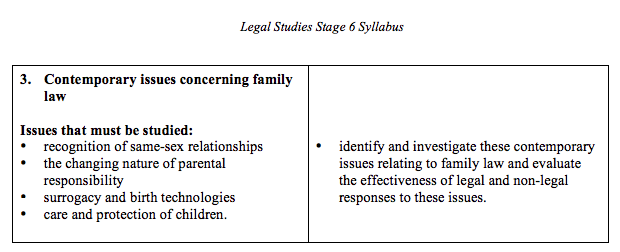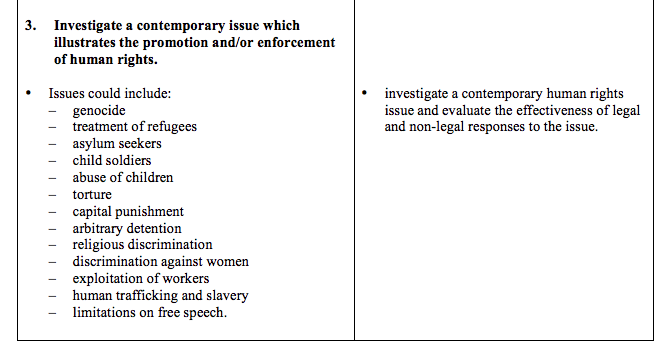|
There has been recent media attention regarding teaching of controversial issues in schools after a primary school was directed to remove two sections of their school newsletter which showcased student work. The showcased work was two letters to the Prime Minister regarding climate change. This was reported in the Daily Telegraph. Can we teach controversial issues? There is a lot of discussion in online teacher Facebook groups and on Twitter regarding teachers’ concerns about teaching their subjects given this recent media article. Subjects such as Legal Studies, Geography, History, Society and Culture and Studies of Religion cover a vast amount of content that could be considered controversial depending on the context. NSW public schools are guided by the Department of Education’s Controversial Issues in Schools policy and our Code of Conduct policy, while religious/independent schools are likely to also have other layers determining what is and isn’t controversial (e.g. religious doctrine). The department policy does not state that controversial issues can’t be covered in class, but does give some guidelines about how to cover them. The policy states that it is a teacher’s responsibility to “...ensure that the delivery of curriculum, school programs and activities, presentations and activities by external providers or other events involving students are age appropriate, relevant to curriculum aims and objectives and consistent with the values of public education and the school’s purpose and goals.” The department’s policy states that once staff identify a controversial issue that they need to “...ensure balanced and reasonable consideration of various viewpoints occurs in the delivery of curriculum, school programs and activities, in presentations to students by visitors, staff, contractors or external providers and on school excursions.” In other words, if you are teaching an issue like climate change, same-sex marriage or a controversial urban development, teachers are meant to provide a range of viewpoints about the issue. In most HSIE subjects this is quite easy because the syllabus usually requires it, but what about sections of the syllabus that don’t ask for different perceptions? There are some cases where the syllabus doesn’t ask us to look at a range of different viewpoints. For example, in 2015 around the time of the referendum, same-sex marriage may have been considered as a controversial issue. In Legal Studies when examining contemporary issues in the Family topic the syllabus does not ask for a discussion on perspectives, only legal and non-legal responses. So what do we do in this situation? Teach the syllabus. It’s that simple. A discussion on non-legal responses would provide the scope to examine a range of perspectives. Teachers just need to use professional judgement to know when to pull the conversation back or when to move onto another topic. A further example of this includes contemporary issues in the Human Rights topic such as genocide, treatment of refugees, asylum seekers or abuse of children. Age appropriateness A question raised in some online discussions was whether it was appropriate for students to be studying extinctions or climate change at primary school. These topics could be covered in multiple places in Geography in primary school (for example in Stage 3 Factors that Shape Places topic). The NSW Geography syllabus is based on the Australian Curriculum which was signed off by ministers from each state in 2013. Both the Australian and NSW syllabus had many rounds of consultation, at which point any of those issues could have been removed, but weren’t. Climate change and extinctions could be covered in the Key Inquiry Questions in Stage 3 (see below) "How do people influence places and the management of spaces within them?" A range of other issues would also be addressed such as farming, land clearing, and settlements, but other more controversial issues such as climate change and extinctions are equally valid. The previous Geography syllabus actually encouraged student activism. In Year 10 students were encouraged to propose actions to promote sustainability, social justice and equity as part of “Active Citizenship”. Letter writing and protests were key features of the course content, and found in most of the text books and online resources for the topic at the time. While this specific content has been removed from the Geography syllabus, Sustainability is one of the cross curriculum priorities and Civics and Citizenship is identified as "...important learning for all students..." across all new NSW syllabuses that have been introduced thus far.
Values of public education The values of public education are: integrity, excellence, respect, responsibility, cooperation, participation, care, fairness and democracy. The descriptions of the core values from the DoE are found on the website, but some of the key values in this case are: INTEGRITY: Being consistently honest and trustworthy. EXCELLENCE: Striving for the highest personal achievement in all aspects of schooling and individual and community action, work and life-long learning. RESPECT: Having regard for yourself and others, lawful and just authority and diversity within Australian society and accepting the right of others to hold different or opposing views. RESPONSIBILITY: Being accountable for your individual and community's actions towards yourself, others and the environment. COOPERATION: Working together to achieve common goals, providing support to others and engaging in peaceful resolution of conflict. PARTICIPATION: Being a proactive and productive individual and group member, having pride in and contributing to the social and economic wealth of the community and the nation. CARE: Concern for the wellbeing of yourself and others, demonstrating empathy and acting with compassion. FAIRNESS: Being committed to the principles of social justice and opposing prejudice, dishonesty and injustice. DEMOCRACY: Accepting and promoting the rights, freedoms and responsibilities of being an Australian citizen. Managing controversy In any school it is not unusual for staff to have regular conversations about what is and isn’t acceptable, controversial, sensitive, etc. Society and the students we teach are always changing, and what was acceptable 5 or 10 years ago, might not be ok now. Conversely what was considered controversial once, may be central to a syllabus now. Different school communities will have different beliefs, values and viewpoints even within the same system. Teachers have to get to know their own community to get an understanding of what will be considered as controversial within that context. While it isn’t unusual for these discussions to happen in schools, what is unusual is for it to be reported by national media. Elections and schools What is and isn’t a controversial issue is largely about context - the age of the students, the links to the subject, etc. It is often not only about the factors listed in the policy but also where we are in the political cycle. In the lead up to a state election schools are not able to make political statements, statements about controversial issues or do photo opportunities with politicians. This is called “caretaker period” and many NSW government departments and organisations have similar processes in place. This is because public schools are overseen by the NSW government. It is not usual practice that there would be intervention regarding a federal election issue, and it is interesting to note that only the Daily Telegraph ran an article about this particular issue. Given the scientific evidence, many would feel that climate change is a topic that doesn’t require an analysis of different viewpoints, but rather just myth de-bunking.
0 Comments
|
Categories
All
Archives
May 2024
|



